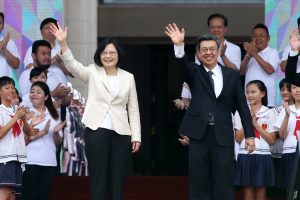When Taiwan President Tsai Ing-wen was inaugurated for her second term in May, she was enjoying sky-high approval ratings due to her administration’s successful COVID-19 response. The country has seen just 446 total coronavirus cases and there has been no local transmission in over two months.
Much of this was due to former Vice President Chen Chien-jen, an epidemiologist who served as Taiwan’s health minister during the 2003 SARS outbreak. Chen won international plaudits when, as the coronavirus spread around the world, he acted as both politician and scientist, becoming a trusted public authority while taking time to analyze transmission trends and oversee vaccine development and test production efforts.
Chen’s public profile was soaring along with Tsai’s. But on the same day she was inaugurated, he stepped down and was replaced by current Vice President William Lai, Tsai’s former premier who became her political rival when he launched an ultimately unsuccessful challenge in last year’s Democratic Progressive Party (DPP) presidential primary.
Chen announced in March 2019 he would not seek a second term as vice president, a move widely seen as a precursor to Tsai nominating Lai as vice president in a bid for party unity. At the time, polls projected Tsai to lose January 2020’s general election and her administration was still licking its wounds from the DPP’s resounding defeat in the 2018 regional elections, in which the opposition Kuomintang (KMT) swept several key mayoral races.
Lai initially shunned Tsai’s efforts to add him to her ticket, instead staying in the DPP primary until he was defeated in a June vote. But Tsai added Lai to her ticket anyway to ensure support from a faction of the DPP that favors Lai’s more robust approach toward seeking independence, in contrast to Tsai’s stated policy of maintaining the cross-strait status quo.
Chen, by contrast, stayed out of political dogfights, going as far as to never formally join Tsai’s DPP, instead remaining an independent. He left office revered by Taiwanese people as a committed public servant and was widely praised for becoming the country’s first vice president to voluntarily give up his pension.
In contrast to his visibility during the COVID-19 crisis, Chen kept a relatively low profile for much of his vice-presidential tenure. He and Lai, who was premier at the time, were closely involved in a successful yet controversial 2018 push for pension reform that hurt the administration’s popularity and precipitated its losses in regional elections later that year.
A devout Catholic, Chen made three trips to Vatican City, one of Taiwan’s few diplomatic allies, where he met Pope Francis. The trips gained mixed reactions: In 2018, Chen received criticism for appearing to imply the pope was considering a visit to Taiwan the next year. The pope did not visit, but Taiwan did maintain its diplomatic relations with the Vatican despite a Chinese push to convince the Holy See to establish ties with Beijing.
Chen has now been supplanted by Lai, a former mayor of the southern city of Tainan.
A polarizing presence within the DPP even before stepping down as Tsai’s premier, Lai has been a vocal proponent of independence. He notoriously called himself a “political worker for Taiwan independence” in 2018, although he and Tsai have both said they believe Taiwan is already a sovereign country and has no need to declare independence.
Unlike Chen, Lai is perceived as an ambitious politician and has been widely tipped as the frontrunner to become the DPP presidential nominee in the 2024 election, when Tsai will be term-limited.
Since becoming vice president-elect in January, however, Lai has kept a low profile and, in public appearances, has remained in relative lockstep with Tsai. In recent weeks, as coronavirus fears have declined, the government has emphasized its initiative to make the country bilingual in Chinese and English – a longtime goal of Lai’s stemming back from his days as mayor of Tainan.
Lai will be tasked with being seen as a loyal deputy to the popular Tsai, despite challenging her just one year ago, while simultaneously expanding his own political profile for his expected 2024 presidential run.
Chen, meanwhile, is already back to work: After leaving his post as vice president, he returned to his former research position at Academia Sinica’s Genomics Research Center.
































